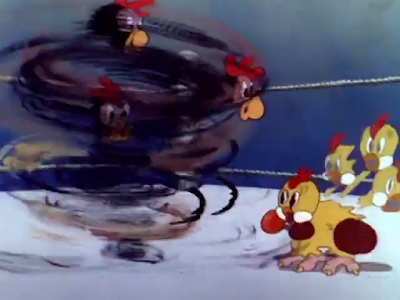
See these cutsy-ootsy mice? Wouldn’t they be at home in a mid-1930s Freleng cartoon? (My guess is this scene was animated by Virgil Ross, who later spent what he recalled were some good years in the Freleng unit). The girl mouse-in-love even has a squealing Berneice Hansell voice for added sentiment. They even sing the title tune together in a strolling dance.
No, Tex, no! Don’t drink the Kutie-pie Kool Aid! Even if you did animate Bugs Bunny selling the stuff years about 2½ decades later.

Hurray! We’re saved! Now we’re in for fun. Irv Spence is here with some crazy expressions for the Three Ratz Brothers (a parody of the Three Ritz Brothers of vaudeville).




Sun visors are a convenient way to change the light colour projected to the stage.

More Ratz Brothers. He’s crying because he hasn't got a hat (from the song of the same name, which is what is being sung during most of the sequence).







Not only do we get the obligatory title song, we get the Ratz Brothers doing even more singing.This doesn’t strike me as Tex’s approach to a story at all. And the basic plot goes back to the Harman-Ising days—in a store, the bad guy kidnaps someone’s girl-friend. The boyfriend and others gang together to get rid of the villain. There’s cycle animation of applause that gets reused. All very Freleng-like.
Want radio references? Avery drags out one he used in A Gander at Mother Goose (1940)—the Listerine slogan “Why doesn’t someone tell me these things?” A mouse under a cowboy hat yells “Buck Benny rides again!” with an Andy Devine mouse (played by Danny Webb?) pulling up a farmer’s straw hat and adding “Hello, Buck!” When the green-faced rat is captured, he turns to the camera and says “Tain’t funny, McGee.”

For some reason, during one sequence, George the boy mouse woo-hoos like Daffy Duck. Daffy had only appeared in one cartoon when A Sunbonnet Blue was released. The personality change doesn’t make sense, but I guess Avery liked it, so in it went.
Avery decides to end the cartoon with a photograph of a baby bonnet and booties. He’d use a variation on the procreation ending at MGM on Little Johnny Jet.
As for voices, Mel Blanc joins the others already mentioned. I haven’t a clue who’s playing George.
Avery’s animators at this time consisted of Spence, Virgil Ross, Sid Sutherland and Paul Smith. 1937 was a year of change for the Avery unit. Chuck Jones and Bob Clampett went over to the Ub Iwerks studio where Looney Tunes were being contracted out. When Clampett took over, Bobe Cannon left Avery to work for him. Elmer Wait was promoted to animator but soon died. Spence didn’t stay too long. He left for MGM when it set up its cartoon studio in 1937 and stayed there until he left for Animation, Inc. in the mid-’50s.
Jerry Beck once interviewed Friz about Tex, mainly about leaving Warners in 1941. Here’s a portion of it, from Animato! 18, Spring 1989.
FF: When he got over to MGM he was a very unhappy man, because Bill [Hanna] and Joe [Barbera] took over. He was second banana, no matter what he did. He tried desperately. I look at his cartoons and see elements of desperation.
 He was afraid to do subtle things. Tom and Jerry had that. They had little personalities, and subtleties, and things like that. Of course they had the broad gags - they were stealing part of Tex's stuff, the broad stuff.
He was afraid to do subtle things. Tom and Jerry had that. They had little personalities, and subtleties, and things like that. Of course they had the broad gags - they were stealing part of Tex's stuff, the broad stuff.
He was a fun guy to work with. Everybody liked Tex, but Tex was so insecure. I felt about his cartoons that he overdid them because he was so insecure about them. He couldn't do a subtle cartoon. If he did something, it had to be twice as strong as anybody else, because he was insecure about what he was doing.
It seemed like he never came up with a strong personality after he left Warner's. Tex was so anxious to please he was overdoing everything. He should have come up with characters like Bugs Bunny, things like that...
But I think he created a kind of contemporary art with that desperation, when you look back. His stuff was nothing I admired.
JB: What's great is that your stuff and Tex's stuff is different. It's different, and yet they're both funny, and they both use the cartoon medium to its potential.
FF: Well, you put your own personality in. Tex was a very introverted man. I think he had real family problems. You didn't know Tex; I never knew him outside of his outer skin.
Getting back to Warners, Tex went back and forth from black-and-white to colour cartoons during 1937. He directed some of Porkys and another mouse cartoon (Ain't We Got Fun) before coming up with his excellent fairy tale parody, Little Red Walking Hood, far and away the most fun short he made that year.
The song “A Sunbonnet Blue (And a Yellow Straw Hat)” was written by Irving Kahal and Sammy Fain and © June 24, 1935. The score includes some Stalling stalwarts: “Put On Your Old Grey Bonnet,” “Japanese Sandman,” “Little Old Fashioned Music Box,” “The Lady In Red,” and “Freddy the Freshman (The Freshest Kid In Town)” in addition to aforementioned unchapeau song.
Here’s the great Billie Holliday singing the title song.









































